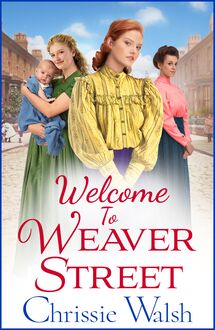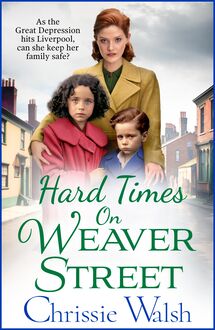-
 Univers
Univers
-
 Ebooks
Ebooks
-
 Livres audio
Livres audio
-
 Presse
Presse
-
 Podcasts
Podcasts
-
 BD
BD
-
 Documents
Documents
-
- Cours
- Révisions
- Ressources pédagogiques
- Sciences de l’éducation
- Manuels scolaires
- Langues
- Travaux de classe
- Annales de BEP
- Etudes supérieures
- Maternelle et primaire
- Fiches de lecture
- Orientation scolaire
- Méthodologie
- Corrigés de devoir
- Annales d’examens et concours
- Annales du bac
- Annales du brevet
- Rapports de stage
La lecture à portée de main
Découvre YouScribe en t'inscrivant gratuitement
Je m'inscrisDécouvre YouScribe en t'inscrivant gratuitement
Je m'inscrisEn savoir plus
En savoir plus

Description
If you love Katie Flynn and Pam Howes, you'll love Chrissie Walsh's WWI story of love, loss and triumph!
Kitty and Tom Conlon arrive in Liverpool in July 1916 to claim the house Tom’s great-uncle has bequeathed him in his will. The move to England couldn’t have come at a better time. Dublin is in turmoil following the Easter Uprising and Kitty’s brother is now in prison.
The house in Weaver Street is all they hoped for, and after a shaky start with her new neighbours, Kitty believes the world is her oyster. Until that is, Tom is conscripted into the navy.
With Tom away, it’s up to Kitty and the women of Weaver Street to get each other through the war.
Praise for Chrissie Walsh:'An authentic Yorkshire saga – you can almost hear the clacking of the looms. Add a feisty mill girl, determined to fight injustice, and you'll be reading through the night' Alrene Hughes, on The Girl from the Mill.
'Full of joy, sorrow and a big pinch of fun. I loved it' Elizabeth Gill, on The Child from the Ash Pits
'A captivating story of family, relations and the complexities of life. With truly heart-tugging moments that make you shed a tear. The Child from the Ash Pits is everything a good read should be' Diane Allen, on The Child from the Ash Pits
What readers say about Chrissie Walsh:'I could not fault any of this book, as the author brings all the characters to life, its such an interesting story that will engross readers all the way through. Loved it.'
'Really well written and very enjoyable, keeping the reader engrossed and gripped until the very last page.'
'Thoroughly enjoyed this book. I was engrossed from start to finish. Good strong characters, and strong storyline. Great author. I recommend.'
'The author writes so descriptively about the characters you feel you know them inside out. A brilliant read and I can’t wait for the next novel to be published.'
Sujets
Mashups
Conflict Resolution
Feminist
20th Century
Siblings
Bereavement
Historical
HISTORY
Women
Dublín
Inglaterra
Mulberry Lane
Friendship
Historical romance
Dating
World War I
Nadine Dorries
Sibling
General officer
Ireland
Military
Historical fiction
Woman
Feminism
The Women
City Life
Stephen Ireland
General
Grief
Sagas
Family Life
War
Romance
England
Saga
Death
Liverpool
Fiction
Prison
Première Guerre mondiale
Dublin
Informations
| Publié par | Boldwood Books |
| Date de parution | 25 juillet 2022 |
| Nombre de lectures | 0 |
| EAN13 | 9781802809350 |
| Langue | English |
Informations légales : prix de location à la page 0,2050€. Cette information est donnée uniquement à titre indicatif conformément à la législation en vigueur.
Extrait
-
 Univers
Univers
-
 Ebooks
Ebooks
-
 Livres audio
Livres audio
-
 Presse
Presse
-
 Podcasts
Podcasts
-
 BD
BD
-
 Documents
Documents
-
Jeunesse
-
Littérature
-
Ressources professionnelles
-
Santé et bien-être
-
Savoirs
-
Education
-
Loisirs et hobbies
-
Art, musique et cinéma
-
Actualité et débat de société
-
Jeunesse
-
Littérature
-
Ressources professionnelles
-
Santé et bien-être
-
Savoirs
-
Education
-
Loisirs et hobbies
-
Art, musique et cinéma
-
Actualité et débat de société
-
Actualités
-
Lifestyle
-
Presse jeunesse
-
Presse professionnelle
-
Pratique
-
Presse sportive
-
Presse internationale
-
Culture & Médias
-
Action et Aventures
-
Science-fiction et Fantasy
-
Société
-
Jeunesse
-
Littérature
-
Ressources professionnelles
-
Santé et bien-être
-
Savoirs
-
Education
-
Loisirs et hobbies
-
Art, musique et cinéma
-
Actualité et débat de société
- Cours
- Révisions
- Ressources pédagogiques
- Sciences de l’éducation
- Manuels scolaires
- Langues
- Travaux de classe
- Annales de BEP
- Etudes supérieures
- Maternelle et primaire
- Fiches de lecture
- Orientation scolaire
- Méthodologie
- Corrigés de devoir
- Annales d’examens et concours
- Annales du bac
- Annales du brevet
- Rapports de stage







